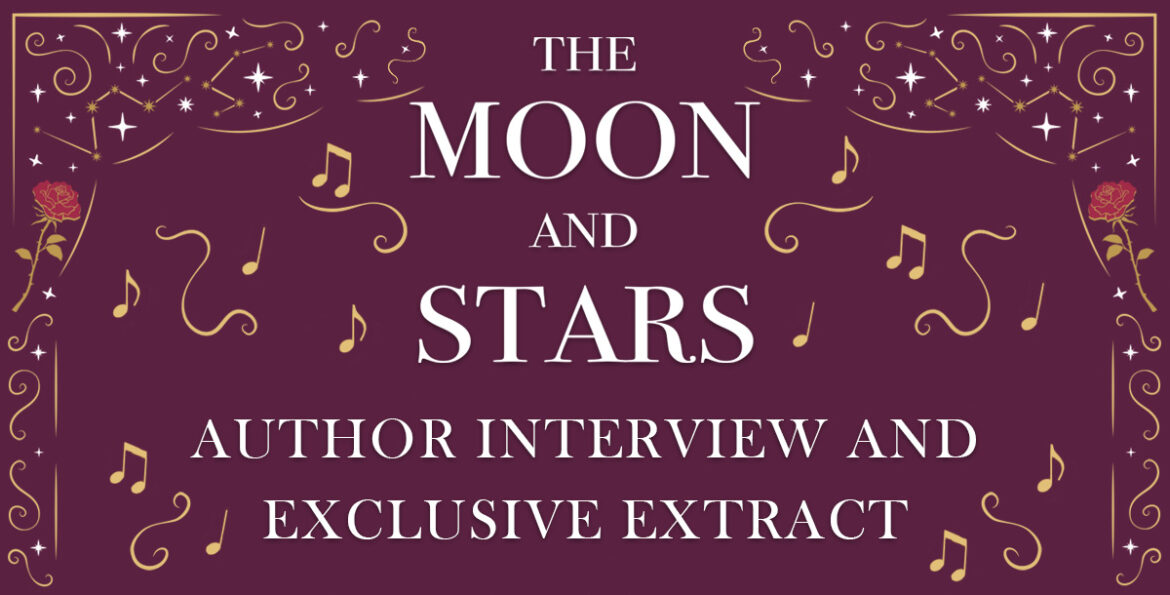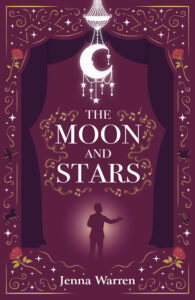

Jenna Warren interview and exclusive extract
- 13th October 2022
- Category : Author,Blog,Interviews & Blogs
Jenna Warren is the author of The Moon and Stars, a warm and witty novel loosely inspired by The Phantom of the Opera and Cyrano de Bergerac, publishing on 20 October 2022. Matthew Capes is a classical tenor with a magnificent voice, but struggles with chronic stage fright. When his old singing partner Angela offers him the chance to perform in a nationwide tour, Matthew hatches a plan: he will sing in the shadows while his handsome and charismatic friend Ralph takes to the stage with Angela. What could go wrong? Read this interview with Jenna Warren to find out more, and to see an exclusive sneak peek of The Moon and Stars.

If you could describe The Moon and Stars in one word, what would it be?
Theatrical
How did you start writing and what does writing mean to you?
I’ve enjoyed writing since I was in primary school. As a teenager, I started to write fanfiction, and a friend encouraged me to post it online. I received some lovely feedback from readers.
While I was studying theatre at university, I started writing some original fiction. I won second prize in a competition run by Writing Magazine. This made me decide I wanted to take my writing more seriously, so I enrolled on an MA in Creative Writing at Teesside University.
Writing means so much to me. It was my hobby, and then it became a passion. I just love books and reading, and it’s another way I can participate in this art form that I love.
What inspired you to write The Moon and Stars?
I wanted to write an original novel inspired by The Phantom of the Opera, but I didn’t want it to be a horror story or a Gothic romance, and I wanted it to have a modern setting. I created my main character, Matthew, who has some of the same traits as the Phantom: low self-esteem, immense talent and a love of music. I thought it would be fun to place him in the world of contemporary musical theatre, another of my passions.
I was also inspired by Cyrano de Bergerac, the play by Edmond Rostand. The plot of Cyrano – two men who believe their perceived shortcomings mean they’ll be unlucky in love and decide to join forces – was a big influence.
But mainly, I think I just wanted to write a love letter to the theatre! I love theatre of all kinds, and I also love theatres as buildings. I had great fun creating the Moon and Stars Theatre.
Music is an important theme in The Moon and Stars. How did music influence your writing, and how did you approach using multiple musical genres as themes in your writing?
Music was a huge influence on my writing. I’ve always loved novels about music. I think writing about it, and live performance in general, is an enjoyable challenge. Music, for me, is very much about being ‘in the moment’, and it’s interesting to try and capture that in prose. I’m also a strong believer in the power of music to bring people together, and I wanted to explore this in The Moon and Stars.
In terms of genres, I’m going to be honest and say I chose all my favourite music. I enjoy most music, but my favourite genres are musical theatre, melodic rock and classical. I wanted to set up a sort of dialogue between rock and classical in particular. When the novel starts, Matthew is a bit of a music snob, which was tremendous fun to write.
Did you listen to any particular music while writing The Moon and Stars?
I can’t really concentrate on writing and listening to music at the same time, so usually I’ll listen to some music to ‘set the scene’ in my head, and then write afterwards.
While working on The Moon and Stars, I listened to a lot of strong male vocalists from the world of rock and musical theatre. Meat Loaf, Freddie Mercury and Josh Groban were particular favourites. Where the novel features a named song, I listened to it so I could try and capture the mood.
Was there a part of the story that you found difficult to write?
It took me a while to work out the Moon and Stars Theatre story line. In the early drafts, Matthew was unemployed. But as I worked on the novel, I realised that the action needed to take place with a particular building at its heart. The Paris Opera House is central to the premise of The Phantom of the Opera, and without a theatre, Matthew seemed a bit directionless. So I gave him a theatre to love and worry about.
Did your work as a bookseller influence how you approached writing The Moon and Stars and if so, how?
Mainly in the sense that being surrounded by books is hugely inspiring! Running my bookshop also means I get to meet authors, and most of them have been friendly and generous with their advice.
I think my work as a bookseller has helped me keep a sense of perspective. I love books, and I’m lucky to have met lots of other people who love them too, but bookselling and publishing are also businesses. Rejection can be very tough, but it’s not personal. The things I’ve learned from bookselling helped me persevere when I was finding writing or querying difficult.
What’s the most surprising thing you’ve learned through your writing?
That I’m persistent. I had the idea for The Moon and Stars nearly ten years ago. There were quite long periods during that time when I wasn’t writing anything, but I kept going back to the story.
What’s your favourite book and who is your favourite author?
My favourite book is The Humans by Matt Haig. I love books with strong, character-driven voices, and this novel is an incredible example of that. I also love the observational humour, the sense of ambiguity (is he really an alien?), and its compassion.
My favourite author is David Nicholls. Again, I love his humour and his characters. The Understudy is my favourite of his novels. I really want a film version!
Do you have a writer’s habit that helps you ‘get in the zone’?
I nearly always listen to music to set the scene and relax me into writing. I try to make the music appropriate to whatever I’m writing. At the moment, I’m listening to a lot of classical music.
Do you have a writing schedule?
Not a strict one. I wish I was that disciplined! But I do try to write on Sunday afternoons, and early on weekday evenings.
Where do you tend to write?
At home, in my bedroom. I very occasionally write in the bookshop if it’s a quiet day.
What do you hope people take away from reading your book?
I hope people enjoy it, and that it makes them laugh. But on a more serious note, I hope it’s a reminder not to compare ourselves unfavourably with other people. Matthew is constantly comparing himself to the other characters, especially those who have hit what he views as important life milestones. I think it’s easy, particularly in a world where social media is so prevalent, to play this comparison game.
What’s a piece of advice you can give to aspiring authors?
Write what you enjoy, whether it’s fanfiction, surreal fantasy, or whatever. I think it’s helpful to read widely, because I’ve learned a lot from reading books outside my genre, but ultimately I think you have to write what you love, and explore subjects that interest you. Writing a novel is a long process, so I think it’s important to enjoy it.
*
Keep reading for a sneak peek of The Moon and Stars…
I stood in the darkness backstage, trembling.
Onstage, my singing teacher was making her introductions. I could hear the pride in her voice. Phrases like ‘dedicated to his craft’ and ‘professional accolades’ and ‘tenor of extraordinary potential’ drifted towards me.
She said my name, and there was applause from the auditorium.
This was my cue to appear. My nerves were screaming at me to run, to flee the Conservatoire and keep running until I forgot the whole dreadful scene. But my body had switched to automatic, and a moment later I had slipped out of the shadowed wings and was standing centre stage.
The auditorium loomed in front of me like a vast cavern, cold and dark. It was a modern space, all sharp corners and straight lines, with none of the elaborate decoration present in most older theatres.
Every seat was taken. I couldn’t see the faces of the audience, but I knew they were looking at me.
I took a breath. Of course they were looking at me. I was onstage. Wasn’t this what I wanted?
Somebody giggled. Several coughs echoed off the black walls.
The spotlights burned brighter than any sun, shining on my face. I had only just managed to stop crying, and I knew most of the concealer had been rubbed away. They would be able to see the dark shadows under my eyes, every pore and blemish on my pale skin.
Someone was playing the piano. The sound seemed very far away.
I’d missed my cue.
I tried to ignore the taunts inside my head. I nodded at the musical director. The piano started again.
I opened my mouth to sing, but the voice that emerged was quiet and flat. It didn’t sound like my voice at all. I cracked a note, and my voice fell silent.
There was no sound from the auditorium. I looked into the wings. My singing teacher was staring at me in horror.
I ran.
*
The Moon and Stars is publishing on 20 October 2022. Pre-order now from Bookshop.org, Blackwell’s and Waterstones.














